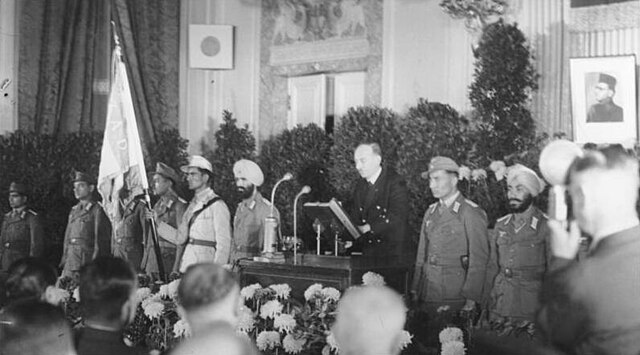The Provisional Government of Free India or, more simply, Azad Hind, was a short-lived Japanese-supported provisional government in India. It was established in Japanese occupied Singapore during World War II in October 1943 and has been considered a puppet state of the Empire of Japan.
Subhash Chandra Bose proclaims the Provisional Government of Free India on 21 October 1943, Singapore
National celebration at the founding of the Provisional National Indian government at the Free India Center, Berlin, with Secretary of State Wilhelm Keppler speaking, on 16 November 1943.
Greater East Asia Conference in November 1943, participants left to right: Ba Maw, Zhang Jinghui, Wang Jingwei, Hideki Tojo, Wan Waithayakon, José P. Laurel, Subhas Chandra Bose.
Currency issued by the Azad Hind Bank
Subhas Chandra Bose was an Indian nationalist whose defiance of British authority in India made him a hero among many Indians, but his wartime alliances with Nazi Germany and Imperial Japan left a legacy vexed by authoritarianism, anti-Semitism, and military failure. The honorific 'Netaji' was first applied to Bose in Germany in early 1942—by the Indian soldiers of the Indische Legion and by the German and Indian officials in the Special Bureau for India in Berlin. It is now used throughout India.
Bose, c. 1930s
Janakinath Bose, Prabhabati Bose, and their family, ca. 1905. Sarat Chandra Bose (standing, centre) and Subhas Bose (aged 8, standing, extreme right).
A photograph (1851) of Presidency College, Calcutta which Subhas Bose entered in 1913, but from which he was expelled in 1916
Subhas Bose (standing, right) with friends in England, 1920








